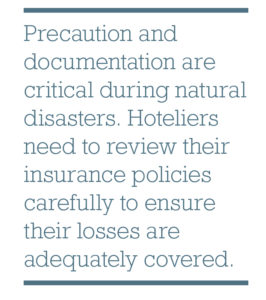NATIONAL REPORT—It seems that each day there are ever-increasing news alerts relating to wildfires occurring out West, which pop up on one’s smartphone or appear as news tickers. Oftentimes, we’re met with images of damaged property, which extends far beyond residential losses.
So, how can hotels located in the areas most susceptible to natural disasters such as these engage in proactive measures to recoup property losses and start anew?
When disaster strikes, precaution and documentation are key, especially when it comes to insurance coverage. With wildfires in Colorado damaging commercial property, hotels are advised to prepare and review their policies carefully.
Linda Kornfeld, vice chair of insurance recovery for Blank Rome law firm, has tips for hotel operators in an area where natural disasters can certainly take their toll.
“It’s important to get your claim in early. The sooner the insurer knows about your claim, the sooner it can be involved in approving expenses you incur to respond to the damage. While not always possible, it helps to try and get the insurer to sign off on those expenses before you make them,” Kornfeld said. Also important is noting deadlines so you can comply with them, and asking insurers for extensions in advance if needed.
But documentation takes center stage here, which can expedite the recovery process for hotels and alleviate some of the difficulty when providing proof of damages.
“Document, document, document. Document before, during and after the event. Having a solid record of your damage, your losses—including lost business—can help your recovery immensely. If your business is not at expected norms, gather and preserve information to prove historic norms, budgets for the year in question and other evidence that helps to support that you lost profits because of the event,” Kornfeld said.
She explained that it’s not just physical damage that properties should be concerned with, but the results as well, such as lost customers because of an inability to access the property or concerns about the impact to the area because of the event.
“Careful documentation before and after the fire can help. If you have suffered actual fire damage, this should not be an issue. The bigger challenge is with respect to proving lost business profits, including that business was reduced because employees or customers could not access your property because of evacuation orders or damage elsewhere,” Kornfeld said.
“This is where keeping careful records, even anecdotal information from newspaper articles about why business is down in the geographic location, generally, can help prove your claim,” she said.
 Proving claims can be tricky, especially in providing information necessary in getting the insurer to support them.
Proving claims can be tricky, especially in providing information necessary in getting the insurer to support them.
“One approach to overcome [this]is to seek insurer participation in the loss evaluation process. However, insurers also seek to challenge necessary expenses as not covered. Be prepared to explain, based upon the policy language, why the insurer’s position is wrong,” Kornfeld said.
Reading and understanding the insurance policy beforehand helps in providing the proper documentation and will most likely result in adequate coverage. It can be difficult to prove lost business in many cases, which is why understanding the specificities of a policy is crucial.
“A big category of damage is lost business. Insurance policies can be very specific about what that means and what you can recover. A careful review of your particular policy language is critical,” Kornfeld said. “For example, you may have ‘contingent business interruption insurance,’ which means that if a key supplier or customer is unable to get to your hotel because of damage to their facility and your business as a result is running at lower capacity, you could be covered for resulting lost profits.”
A common mistake made, Kornfeld explained, is in communication with insurers. This comes when hotel operators describe or characterize damage before thoroughly reading the insurance policy.
“Internal and external communications that describe the loss in a manner that is not coverage favorable can later be argued by an insurer as providing a basis to deny coverage,” she said.
“Know what your insurance policy says before any employee speaks with your insurer or the press,” she said. “It’s important to understand where sensitive coverage issues exist and to present your claim and discuss it with insurance adjusters in a manner that doesn’t walk into a policy exclusion.”
She also recommends speaking with one voice, meaning, in understanding the policy correctly, a company should know how to present its claim to the insurer. Designating one or a limited number of people to communicate helps in ensuring that the message is conveyed consistently.
There are other precautions hotel operators can take, especially in choosing and reviewing policies for the future.
“When buying insurance this year and in thinking about how to better protect your business when the next disaster event strikes, look hard at the extent of the categories of business interruption coverage being offered by your insurer and seek maximum coverage; likely the biggest issue with the wildfires for most businesses was policy limits that were too low,” Kornfeld said. “When renewing insurance, carefully consider the policy limits you buy. Minimal increases in premiums today for more coverage in terms of dollars likely is a good business decision.” HB


